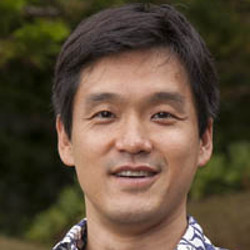Lei Wang PH.D.
College of Natural and Computational Sciences - Department of Natural Science
ASSOCIATE PROFESSOR OF CHEMISTRY
CHAIR, DEPARTMENT OF NATURAL SCIENCE
Education:
- Post-doctoral Fellowship, Swiss Federal Institute of Technology Zurich (ETH Zurich)
- Post-doctoral Fellowship, The Salk Institute for Biological Studies
- Ph.D., in Biophysics, Brown University
- B.S., Physics, Wuhan University
Courses Taught:
- CHEM 2050 General Chemistry I
- CHEM 2052 General Chemistry II
- CHEM 2053 General Chemistry II Lab
- CHEM 3042 Instrumental Analysis
- CHEM 3043 Instrumental Analysis Lab
- CHEM 4031 Biochemistry I Lab
- CHEM 4911 Senior Research
- CHEM 4095 Biochemistry Seminar
Professional Interests:
Protein folding and aggregation in human diseases; protein engineering in bio-nanotechnology
Open Positions:
Dr. Lei Wang joined HPU in September 2012, and he is currently establishing his research group. Research projects are available for enthusiastic students who want to accumulate research experience in biochemistry, molecular biology, biomedicine and bio-nanotechnology fields. Interested students are welcome to contact Dr. Wang.
Personal Interests/Biography:
Traveling, running, hiking, swimming, diving, surfing, skiing, and most importantly, my family
Teaching Interests/Research:
Dr. Wang’s major research interest is protein aggregation, which is involved in more than a dozen of human diseases, such as Alzheimer’s disease, Parkinson’s disease and Cataract. His research group studies several disease-related protein aggregation events, tries to understand their underlying molecular mechanism, and aims to identify effective natural compounds that can interfere with protein aggregation processes to prevent or delay disease onset. For example, his group is interested in studying the protein aggregation mechanism in (a) human memory loss, (b) cataract and human lens clarity, (c) obesity and regulation of food intake. Dr. Wang is also interested in developing bio-nano material by using a special type of protein aggregates, amyloid fibrils, which are genetically modifiable natural bio-nanowires.


